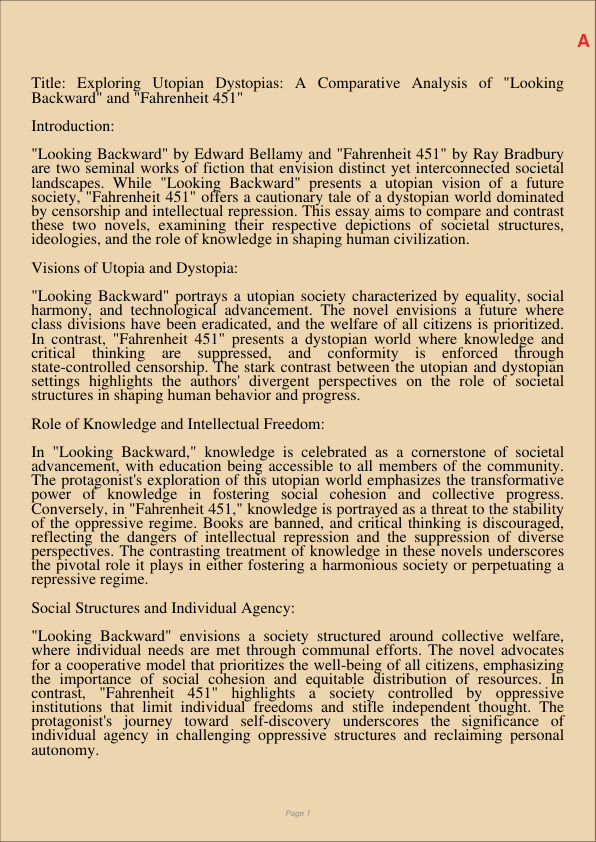A Comparison Of The Novels Looking Backward And Fahrenheit 451
Jan 9, 2024
looking backward
fahrenheit 451
Family & Consumer Science
Law

Title: Exploring Utopian Dystopias: A Comparative Analysis of “Looking Backward” and “Fahrenheit 451”
Introduction:
“Looking Backward” by Edward Bellamy and “Fahrenheit 451” by Ray Bradbury are two seminal works of fiction that envision distinct yet interconnected societal landscapes. While “Looking Backward” presents a utopian vision of a future society, “Fahrenheit 451” offers a cautionary tale of a dystopian world dominated by censorship and intellectual repression. This essay aims to compare and contrast these two novels, examining their respective depictions of societal structures, ideologies, and the role of knowledge in shaping human civilization.
Visions of Utopia and Dystopia:
“Looking Backward” portrays a utopian society characterized by equality, social harmony, and technological advancement. The novel envisions a future where class divisions have been eradicated, and the welfare of all citizens is prioritized. In contrast, “Fahrenheit 451” presents a dystopian world where knowledge and critical thinking are suppressed, and conformity is enforced through state-controlled censorship. The stark contrast between the utopian and dystopian settings highlights the authors’ divergent perspectives on the role of societal structures in shaping human behavior and progress.
Role of Knowledge and Intellectual Freedom:
In “Looking Backward,” knowledge is celebrated as a cornerstone of societal advancement, with education being accessible to all members of the community. The protagonist’s exploration of this utopian world emphasizes the transformative power of knowledge in fostering social cohesion and collective progress. Conversely, in “Fahrenheit 451,” knowledge is portrayed as a threat to the stability of the oppressive regime. Books are banned, and critical thinking is discouraged, reflecting the dangers of intellectual repression and the suppression of diverse perspectives. The contrasting treatment of knowledge in these novels underscores the pivotal role it plays in either fostering a harmonious society or perpetuating a repressive regime.
Social Structures and Individual Agency:
“Looking Backward” envisions a society structured around collective welfare, where individual needs are met through communal efforts. The novel advocates for a cooperative model that prioritizes the well-being of all citizens, emphasizing the importance of social cohesion and equitable distribution of resources. In contrast, “Fahrenheit 451” highlights a society controlled by oppressive institutions that limit individual freedoms and stifle independent thought. The protagonist’s journey toward self-discovery underscores the significance of individual agency in challenging oppressive structures and reclaiming personal autonomy.
Critique of Contemporary Realities:
Both “Looking Backward” and “Fahrenheit 451” serve as critiques of their respective societal contexts. While “Looking Backward” critiques the rampant social inequalities and exploitative labor practices of the Gilded Age, “Fahrenheit 451” critiques the increasing influence of mass media and the suppression of dissenting voices during the Cold War era. These critiques reflect the authors’ concerns about the direction of society and the potential consequences of unchecked power and ideological conformity.
Conclusion:
“Looking Backward” and “Fahrenheit 451” offer contrasting yet complementary perspectives on the societal implications of knowledge, social structures, and individual agency. While “Looking Backward” presents a utopian vision that emphasizes the transformative potential of knowledge and collective welfare, “Fahrenheit 451” serves as a cautionary tale, warning against the dangers of intellectual repression and the erosion of individual freedoms. Despite their differing visions, both novels underscore the critical role of societal structures in shaping human behavior and the imperative of safeguarding intellectual freedom in fostering a just and equitable society. By examining these contrasting narratives, we can glean valuable insights into the complexities of human civilization and the potential consequences of societal trajectories.